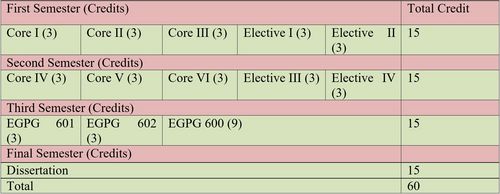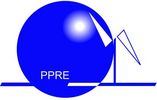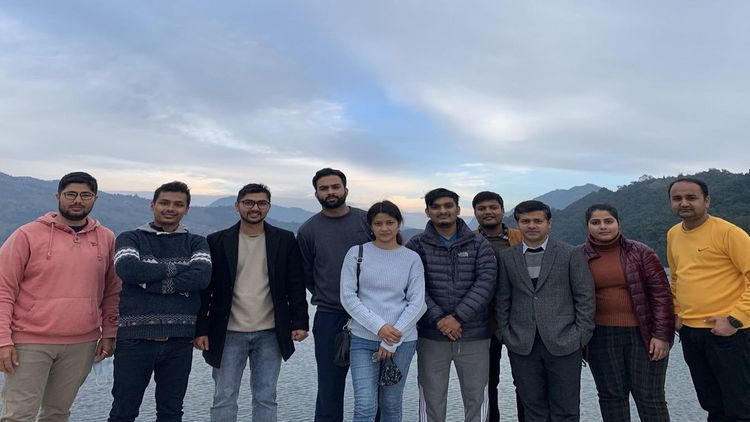Dr. Sunil Lohani, Nepal (PPRE 2006-08), Associate Professor in Renewable Energy and Lead of the Renewable and Sustainable Energy Laboratory in the Mechanical Engineering Department at Kathmandu University in Nepal is coordinating the local Master study programme in Planning and Operation of Energy Systems (MPPOES), which was established in 2012, so celebrating 10th anniversary already these days.
Program Description
Masters of Engineering (ME) in Planning and Operations of Energy Systems (MPPOES) is a master's program at Kathmandu University under the Department of Mechanical Engineering that commenced in 2012. There was biennial intake until 2016, then admission was postponed until 2020 due to other emerging programs at the department. Intake of MPPOES was resumed in 2021 with yearly enrollment from different engineering backgrounds. A master’s degree is an important pillar in a student’s career, which this program represents. The program intake is during February/March and the fee structure for two years course is about Rs. 3,95,000 (approx. equivalent to USD 3,220.00). The fee for the sponsored candidate is 1.5 times the ordinary fee. The fee for SAARC country international candidates is 1.5 times the regular fee and for other country is 2.0 times the regular fee. The students can apply for formula funding scholarships that aim to give more than 50 percent of the students’ partial full tuition fee waiver during their study period. The students are provided with an opportunity to exchange in different countries namely Germany and Norway through student exchange programs to make them familiar with the teaching and research facility, learning style, and culture and bring them back and explore it in their own country.
Courses Structure
MPPOES is of two years (four semester) course. The total credit of the program is 60 credit. Each credit hour requires 15 hour teaching activities. The overall structure of the program is as shown in the table below:

The courses offered in the program are of two categories; core courses and elective courses are offered in the first year of the program. All courses are of 3 credit unless otherwise stated. The courses are listed as follows.
First year Courses:
Core courses
- MOPE 501: Energy Systems Planning and Operation
- MOPE 502: Energy Management and Technology
- MOPE 504: Research Methodology
- MEPG 514: Project Management
- MPEG 520: Power Generation, Transmission and Utilization
- MAPG 501: Advanced Probability and Statistics
Elective courses
- MOPE 507: Solar Power from Photovoltaic
- MOPE 508: Energy from Biomass
- MOPE 508: Wind Energy
- MOPE 506: Environment Impact Assessment of Hydropower
- MOPE 515: Electricity Economics
- MEPG 501: Renewable Energy
- MOPE 503: Energy and Environment
New elective courses under development
- Energy Economics and Markets
- Energy Policy, Legislation and Management
- Decentralized Energy Systems Planning
- International Cooperation and Development
- Energy System Modelling
- Basic and advanced course on Sustainable Development Goals
Second year courses:
- EGPG 601: Guided Course
- EGPG 602: Graduate Seminar
- EGPG 600: Problem Assessment Project (9 credits)
- Dissertation (15 credits)
Course delivery and Co-operations
Faculties with an experience in various sectors including academic, government and industry give lectures on the program. They have shared their imminent ground-based experiences of success and challenges. Likewise, the program has been focusing on renewable energy sources, its sector prevailing for Nepal, and energy systems planning. The program is currently supported by Renewable and Sustainable Laboratory (RSEL) where several Ph.D. and Master’s students are working on various renewable energy topics such as Biogas Technology, Pathways to 100% Renewable Energy, Clean Cooking Transition, Pumped Hydro Energy Storage, Electricity Mobility, Circular Economy and Building Energy, etc. RSEL aims to contribute to the replacement of fossil fuels, reduce greenhouse emissions, diversify the source of energy in the energy mix of Nepal and reduce the dependency on a single electricity source hydropower with other renewable energy such as Solar, Biomass and Wind. RSEL is working together with several national and international partners and currently has fifteen active international collaborations including USA, Australia, New Zealand, Germany, Norway, Sweden, Denmark, China, and India. The MPPOES students would get benefit from these active collaborations for their project, thesis, job, and higher study opportunity. Besides that, the program summons leading national and international relevant experts and conducts various webinars and seminars.
Career Prospective
- Government sector
- NGOs and INGOs
- Bilateral and multilateral organizations
- Research and higher study
- Private Sector
- Entrepreneurship
Student experiences (Batch 2021-2023)

The current students have had a pleasant experience during their first year of the study period. The classes had been shifted from physical to virtual due to the outbreak of COVID-19. There was a fear that the virtual classes would work or not but the shifting turned out to be very fruitful and laudable as the classes turned out to be open-end discussions and the students had saved spacious time for self-learning. Courses instructed under this program have been well versed through technical and practical approaches. Students had real-time observations and participation in sector-wise cases under the direction of professors and instructors. They learned these aspects during their industrial visit which was conducted by the program. Students have been provided with the required tools and facilities to get encouraged in research on subjective domains. Their queries are addressed through consultation with professors and proficient experts.
The experience of the master’s program shared by current students are:
- Dikshant Dhoj G.C.: “One of the best things about KU and the MPPOES course is the practice of learning by doing approach”
- Rohini Khyen: “Practical insights on the sector of renewable energy with network building in the sector”
- Vijan Bhandari: “Best decision enrolling in this program. Many of the courses are very practical and applicable”
For further information contact:
Dr. Sunil Prasad Lohani
Associate Professor, Renewable Energy
Lead-Renewable and Sustainable Energy Laboratory
Department of Mechanical Engineering
Kathmandu University
Email:




